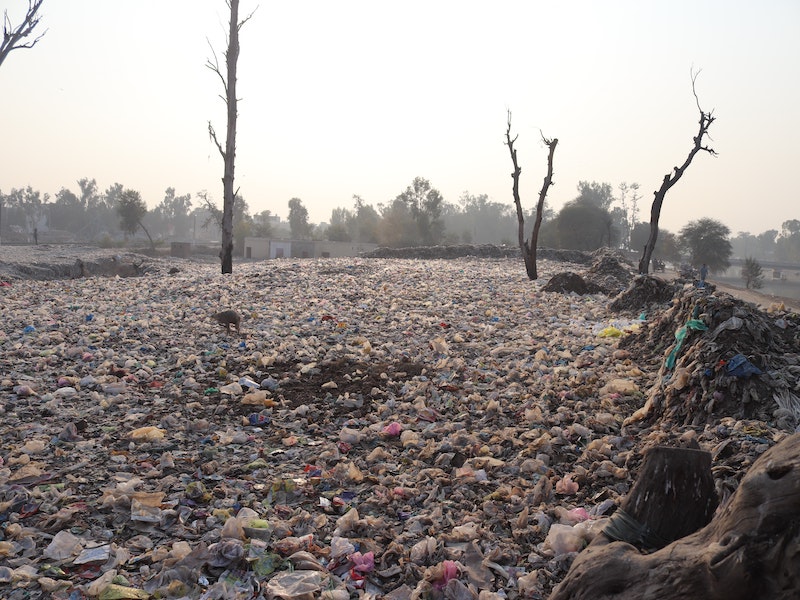The rules of the game companies play by are the problem, not the solution
The world’s largest pension fund recently threatened to sack the board if they don’t seek an investment strategy that helps tackle the climate crisis. The implicit assumption is that free markets can solve the climate crisis if more investments are made in the right type of businesses. The fact emissions keep on rising suggests free markets continue to make the challenges we’re facing worse. Why, then, do we have such unrelenting faith in the power of free markets to solve the problem?
To think about why free markets continue increasing environmental impacts, we need to think about what the problem actually is. At face value, the answer seems obvious; emissions are the problem because emissions are what’s creating global warming, right? Well, no. Emissions are an undesired outcome of economic activity. The underlying cause of emissions is economic activity. The dominant economic system is, of course, free market capitalism, so why are emissions intertwined with the economy?
Capitalism is an economic system that is predicated on never-ending economic growth. Achieving growth is the holy grail for governments because a growing economy creates a rising tide that raises all boats. That rising tide equates to more wealth in society. More wealth means higher incomes. Higher incomes mean individuals have greater potential to maximise their utility, leading to increasing living standards.
The issue with more growth is that never-ending output growth requires increasing production. Making more requires more throughputs, whether that be energy or the physical resources used to produce all of the stuff sold in markets. Increasing production equates to more impacts on the environment, which leads to more emissions. Emissions, then, are inextricably connected to economic growth.
If the overall goal of the economy is economic growth, how does this translate into the rules governing markets? The aim of the game for businesses is to turn a profit. Profit is not the same as economic growth — “profit is the difference between the money a firm makes (revenue) and the money it spends (costs), whereas growth is an increase in total production.” In theory, a business can grow without increasing profits and increase profits without growing, but in reality, the profit motive tends to be intertwined with increases in output.
A market system creates fierce competition between businesses to get a larger market share. To do so, companies aim to sell more products. Selling more means you need to make more. Making more drives the price of an individual product down, decreasing costs which helps to increase margins. Every company must play by these rules to survive.
Companies that can demonstrate profitability and growth potential are more likely to gain injections of funds from investors. Those funds can be used to reinvest in new product lines, technology, or innovations — helping the company to sell yet more products, with the aim of increasing profits and total production. The “imperative to sell more goods, to innovate continually, to stimulate higher and higher levels of consumer demand is driven forwards by the pursuit of growth. But this imperative is now so strong that it seems to undermine the interests of those it’s supposed to serve.” The interests of those it’s supposed to serve are, of course, society, but by and large, those it is serving are the interests of corporations and their shareholders.
The shareholder corporation has become the most powerful type of business. The only responsibility a business has is to its shareholders. The Nobel prize-winning economist, Milton Freidman, wrote as much in Capitalism and Freedom, arguing, “there is one and only one social responsibility of business…engage in activities designed to increase its profits so long as it stays within the rules of the game.” Profit maximisation is the shareholder corporations’ raison d’etre. This consideration must, seemingly, be prioritised above anything else, regardless of the social or environmental consequences.
So, companies are in fierce competition with each other to sell more stuff; the more they sell at a cheaper price, the higher their margins and, with it, their profits. Where do environmental considerations come to play in all of this? None of the rules driving behaviour and decision-making involves consideration for the environment. And yet, all our hopes are being placed on this very same system, spontaneously transforming society onto a sustainable path. If the rules that dictate economic behaviour are creating the problem, it seems borderline schizophrenic to believe it will also be the solution.
Compounding the problem is that it’s no good if companies make more and more stuff if we’re not all convinced to continually buy it. For there to be ever-increasing output, there must be ever-increasing consumption. Most products go through a take-make-use-waste life cycle. As soon as you buy and use a product, companies try and convince you to replace the item with a brand-spanking new version. That product gets thrown away and ends up in landfill for the natural world to deal with.
The result of consumerism is enormous amounts of waste. The world produces 381 million tonnes of plastic waste yearly — 50% of this is single-use plastic. We know single-use plastic has destructive environmental consequences, yet plastic waste is set to double by 2034. Plastic in the oceans kills 100,00 marine creatures, as well as 1 million birds. Overall, we produce over two billion tonnes of waste. As the global middle class grows and more and more people consume, the waste problem is set to get worse. By 2050, global waste is set to reach 3.4 billion tonnes per year. That waste not only kills wildlife and destroys habitats, but it also releases 1.6 billion tonnes of carbon dioxide — 5 per cent of global carbon emissions.
It’s clear that the rules governing markets are not going to lead us onto a sustainable path. They’ll just simply make the problem we’re facing worse. What’s required is rigorous government regulation that creates rules that ensure the best social and environmental outcomes. Governments must play a far more active role in the economy. But a core belief that dominates in the global economy is that markets are the fruit of social prosperity and governments are a meddling force that harms that prosperity. It feels unlikely then that governments will implement appropriate regulations without some kind of crisis that forces them to intervene. But once the climate crisis really feels like a crisis and it becomes abundantly clear that it is, in fact, the rules governing markets that have made the problem worse, it will be too late to do anything about it.



